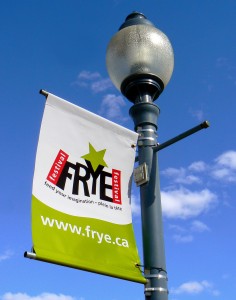I hope you can link up to this wonderful photograph of author Beth Powning with the class of students she met on Thursday. It’s at www.powning.com/beth
Sunday’s the last day. It’s winding down fast now, beginning with a ‘Brunch and Books’ event with 2 authors, Beth Powning and Maryse Rouy. The focus is on literacy and on the winners of the Adult New Writers Contest. It’s always a moving moment when these adults, who have worked hard to improve their reading and writing skills, come foward to stand on a stage named in honour of the great writer and thinker Northrop Frye. It’s probably happening just about now, as I write. I lost an earlier version of this blog entry, or I might have got myself together in time to sit in on the event.
At 1pm, in about an hour, we meet at the Moncton airport to close down the festival. Jesse Robichaud, the festival Poet flyé, will read the poem he’s created over the last several days. We’ll hand out the first “Frye Academy Award” – the Frye Academy being a select group of English and French high school students who’ve read 6 books, half English and half French, and chosen one that they like best – a sort of Canada Reads format, but spread out over several months. Finally we’ll have a draw to see who wins a free trip “anywhere West Jet flies.”
Yesterday was jam-packed, ending with an event called Frye Jam where we ask authors to work with musicians to create a unique blend of words and music. The music is provided by a group called Les Païens, who have hosted this event the last several years. We had a good audience of over a hundred. Anglophones Fred Stenson, Annabel Lyon, and Steven Galloway read beautifully and seemed to enjoy the experience. Steven’s reading from Cellist of Sarajevo, with Kenan having a vision of the city reconstituted and then suddenly hearing the music stop, brought tears to the eyes. The francophone authors, France Cayouette, Biz, Ron Leger, and Guy Marchamps, were equally effective, though in a very different way, as they were poets and performers. It was half past twelve when we emerged from the venue, to a spectacle we (my wife and I) had never seen – the streets of Moncton flooded with hundreds and hundreds of young people bar hopping. Very scantily dressed, some of them, for the cold. Mini-skirts, apparently, are back in fashion.
The dialogue at 6pm (yesterday), with Fred Stenson and Christian Bök, was wide-ranging, relaxed, and somewhat wild, thanks to Christian’s anything but straight laced approach to life. Sparks flew at the end when audience member Steven Galloway took Christian to task for disparaging remarks about Yann Martel’s new novel. Have you even read the book, Steven asked. Christian said no, he hasn’t, but that doesn’t change his criticism: why such a huge publisher’s advance when the result, nine years in the making, is a small book, not immediately recognizable as great and worthy. All that money could have gone to help young, talented, struggling writers. It was good to see Christian and Steven at the bar after the public dialogue, in private conversation, healing their rift, one hopes.
Lots of activities for kids during the day, which I can’t talk about because I wasn’t there. From 3 to 5 there was a “Literary Lounge” at the Festival bookstore site, with authors and reading public having a chance to meet, talk, and get books signed. Very good turn-out of authors, unlike last year, when the timing and the venue were both ill chosen. Noah wrote in my copy of his book: “Next time I’ll have the answers. For now, this.” By “answers” he meant answers to the question of his differences with Frye, which I’d posed to him earlier.
At noon Noah Richler gave his lecture, What We Talk About When We Talk About War, to a large audience gathered inside Council Chambers at Moncton City Hall. The use of this venue is one of many ways the city of Moncton supports and facilitates the festival. The lecture series is named in honour of Antonine Maillet and Northrop Frye, the two fountainheads of creativity in our part of the world. It’s named in their honour in the further hope, now seemingly increasingly problematic, as establishing a Maillet – Frye Chair in the Humanities at the University of Moncton. The money to fully endow such a chair seems to be nowhere in sight.
Noah’s talk will be published by Goose Lane Editions in a few months, maybe in the fall. The talk focused on two forms of story, the epic and the novel. The epic, as Noah uses the term, sets up a clear line between the good guys and the bad guys, and treats the bad as completely other – monstrous, not completely human, not like us. The novel is a “proselytizing” instrument for a different view of the human condition, which sees everyone, including the bad ones, as human. The bad are not all bad. The novel, because its defining characteristic is the imaginative leap into the other, cannot set up the divide between us and them, good and bad. So the novelistic way of thinking is useless to the warmongers who want to drag us into war. They need epic stories, with heroes and villains, to take us into war and to take us through the war, no matter how long it lasts, as in Canada’s engagement in Afghanistan. Noah takes us through all the Christie Blatchfords and their sucking up the Canadian milatary and their disdain for the old peacekeeping model, and in this way he shows how government and academics and media combined to give us Afghanistan. Noah sees hope, though, in the great outpouring of aid and assistance to Haiti, bringing back a sense of what Canada at its best can be.

